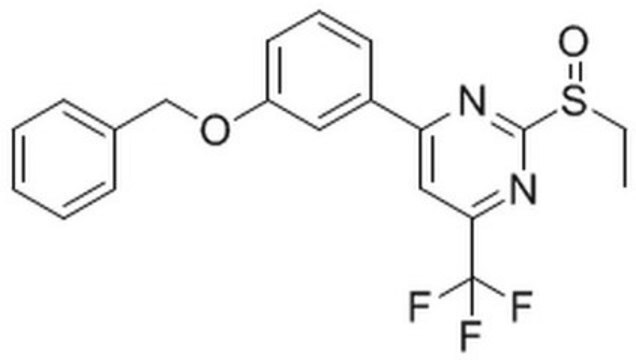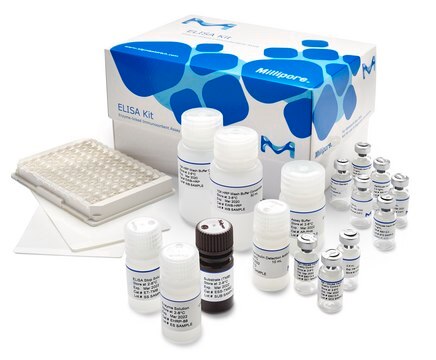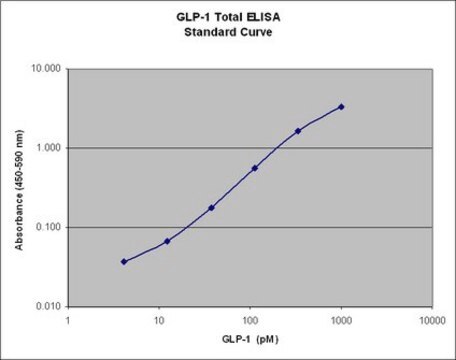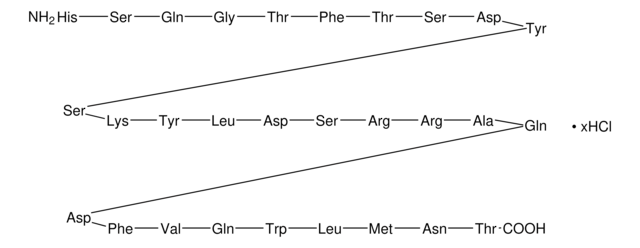G3265
Glucagon-Like Peptide I human
≥97% (HPLC)
Synonym(s):
GLP-1, Preproglucagon 72-108
About This Item
Recommended Products
Quality Level
assay
≥97% (HPLC)
UniProt accession no.
storage temp.
−20°C
InChI
1S/C186H275N51O59/c1-17-94(10)149(182(294)209-98(14)155(267)220-128(73-105-78-199-111-42-28-27-41-109(105)111)171(283)223-123(68-91(4)5)173(285)234-147(92(6)7)180(292)219-113(43-29-31-63-187)158(270)200-81-136(245)210-112(45-33-65-197-185(191)192)157(269)203-84-146(262)263)236-174(286)126(70-102-37-23-19-24-38-102)225-165(277)120(55-61-142(254)255)216-162(274)114(44-30-32-64-188)212-153(265)96(12)206-152(264)95(11)207-161(273)118(51-57-135(190)244)211-137(246)82-201-160(272)117(53-59-140(250)251)215-168(280)122(67-90(2)3)222-170(282)125(72-104-47-49-108(243)50-48-104)226-177(289)132(85-238)230-179(291)134(87-240)231-181(293)148(93(8)9)235-176(288)131(77-145(260)261)228-178(290)133(86-239)232-184(296)151(100(16)242)237-175(287)127(71-103-39-25-20-26-40-103)229-183(295)150(99(15)241)233-138(247)83-202-159(271)116(52-58-139(248)249)213-154(266)97(13)208-167(279)129(75-107-80-196-89-205-107)227-163(275)115(46-34-66-198-186(193)194)214-164(276)119(54-60-141(252)253)217-169(281)124(69-101-35-21-18-22-36-101)224-166(278)121(56-62-143(256)257)218-172(284)130(76-144(258)259)221-156(268)110(189)74-106-79-195-88-204-106/h18-28,35-42,47-50,78-80,88-100,110,112-134,147-151,199,238-243H,17,29-34,43-46,51-77,81-87,187-189H2,1-16H3,(H2,190,244)(H,195,204)(H,196,205)(H,200,270)(H,201,272)(H,202,271)(H,203,269)(H,206,264)(H,207,273)(H,208,279)(H,209,294)(H,210,245)(H,211,246)(H,212,265)(H,213,266)(H,214,276)(H,215,280)(H,216,274)(H,217,281)(H,218,284)(H,219,292)(H,220,267)(H,221,268)(H,222,282)(H,223,283)(H,224,278)(H,225,277)(H,226,289)(H,227,275)(H,228,290)(H,229,295)(H,230,291)(H,231,293)(H,232,296)(H,233,247)(H,234,285)(H,235,288)(H,236,286)(H,237,287)(H,248,249)(H,250,251)(H,252,253)(H,254,255)(H,256,257)(H,258,259)(H,260,261)(H,262,263)(H4,191,192,197)(H4,193,194,198)/t94-,95-,96-,97-,98-,99+,100+,110-,112-,113-,114-,115-,116-,117-,118-,119-,120-,121-,122-,123-,124-,125-,126-,127-,128-,129-,130-,131-,132-,133-,134-,147-,148-,149-,150-,151-/m0/s1
InChI key
UKVFVQPAANCXIL-FJVFSOETSA-N
Gene Information
human ... GCG(2641)
Looking for similar products? Visit Product Comparison Guide
Amino Acid Sequence
General description
Application
Biochem/physiol Actions
Storage Class
11 - Combustible Solids
wgk_germany
WGK 3
flash_point_f
Not applicable
flash_point_c
Not applicable
ppe
Eyeshields, Gloves, type N95 (US)
Certificates of Analysis (COA)
Search for Certificates of Analysis (COA) by entering the products Lot/Batch Number. Lot and Batch Numbers can be found on a product’s label following the words ‘Lot’ or ‘Batch’.
Already Own This Product?
Find documentation for the products that you have recently purchased in the Document Library.
Customers Also Viewed
Our team of scientists has experience in all areas of research including Life Science, Material Science, Chemical Synthesis, Chromatography, Analytical and many others.
Contact Technical Service









